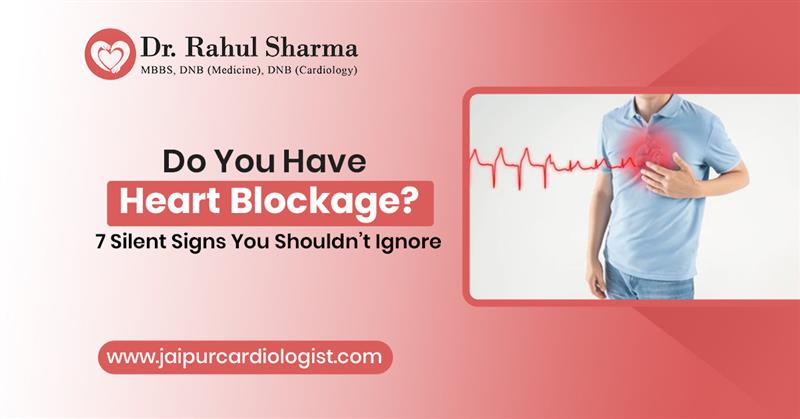
Do You Have Heart Blockage? 7 Silent Signs You Shouldn’t Ignore
We often think that heart problems start with some dramatic pain and then a sudden collapse. Usually, heart blockage develops silently, manifesting in complaints of tiredness, breathlessness, and sometimes even indigestion. These signals are silent signs of heart blockage, which we ignore. Identifying them early can save your heart and prevent significant trouble down the road. Let’s dig into the blog:
What are the silent signs of heart blockage?
1. Fatigue That Doesn’t Make Sense
Normal tiredness goes away after rest. This kind doesn’t. It feels burdensome, as if your body is operating on empty, regardless of how much rest you obtain. Some people describe it as dragging themselves through the day, even with simple tasks. When arteries narrow and blood flow slows, energy supply drops. That unexplained exhaustion could be your body’s early alarm.
2. Breathing Feels Different
Remember the last time you rushed up a staircase? If you suddenly find yourself struggling for air with even lighter activity, carrying groceries, walking a short distance, that’s not something to brush off. Breathlessness like this is often one of the warning signs of heart disease. It may start gradually, but if breathing feels harder than it should, your heart may be telling you it needs help.
3. A Chest That Feels “Off”
Chest pain doesn’t always arrive like a stabbing bolt. Occasionally it’s just pressure, tightness, or a dull warmth spreading slowly. Many people wave it off as gas, acidity, or even stress. But discomfort in the chest that repeats itself, especially during exertion, is worth attention. It may be the heart struggling to get enough oxygen.
4. Pain That Wanders Around
Here’s a tricky one. Blockage doesn’t always hurt right where the heart is. Instead, the discomfort may travel to your jaw, your neck, your arms, or even your back. People often think they’ve pulled a muscle or slept badly. In truth, this moving, shifting pain can be a silent sign of heart blockage that too often is misread until it’s too late.
5. Sweating for No Reason
You’re sitting in a cool room, not moving much, and suddenly you’re drenched. Cold, clammy sweat, without any exercise, isn’t normal. Survivors of cardiac issues often recall this feeling as one of the scariest signals they ignored. The body sometimes reacts this way when the heart is under unusual strain.
6. Indigestion or Nausea That Keeps Coming Back
A sour stomach, bloating, or nausea typically indicates issues related to food or digestion. But occasionally, they’re tied to reduced blood flow to the heart. Because it feels like acidity, many people keep reaching for antacids, delaying real treatment. If stomach discomfort lingers and appears with other unusual symptoms, it may not be your gut at all.
7. Dizzy Spells and Lightheaded Moments
You may feel dizzy or lightheaded when standing up or engaging in physical activity. While occasional dizziness may not be serious, experiencing it frequently could indicate insufficient oxygen intake in your brain. When blood flow is blocked, it is a warning sign you need to take seriously. Listening to these signs early can help avoid more complicated heart diseases.
When Should You Take Action?
When should you consult a cardiologist? In truth, if one of these symptoms recurs frequently enough, it’s a good reason to consult a doctor. Knowing when to see a cardiologist could make the difference between simple preventative medicine and a medical emergency. Early tests can reveal blockages, and lifestyle changes or medications can help prevent the need for surgery.
What prevention can be taken?
- Limit use of fried foods and oils and increase consumption of fruits, vegetables, and wholesome grains.
- Be active and walk or exercise daily for a minimum of 30 minutes.
- Stop smoking and drinking alcohol
- Reduce your stress through meditation, yoga, or just focused breathing.
- Visit the healthcare experts for an ordinary checkup, which includes testing cholesterol and blood pressure.
- Keep your weight down to avoid putting excess stress on your heart.
Closing Thought
The biggest danger with heart blockage is its silence. These symptoms—fatigue, breathlessness, odd chest sensations, even indigestion—don’t scream for attention, but together, they whisper a warning. And as one wise doctor said, “The heart always whispers before it cries out. The question is, are you listening?” Listening to your body isn’t fear—it’s wisdom. Paying attention to these subtle hints could be the step that keeps you safe tomorrow. If you ever feel unsure, consulting a heart specialist in Jaipur can give you the right guidance and timely care.



